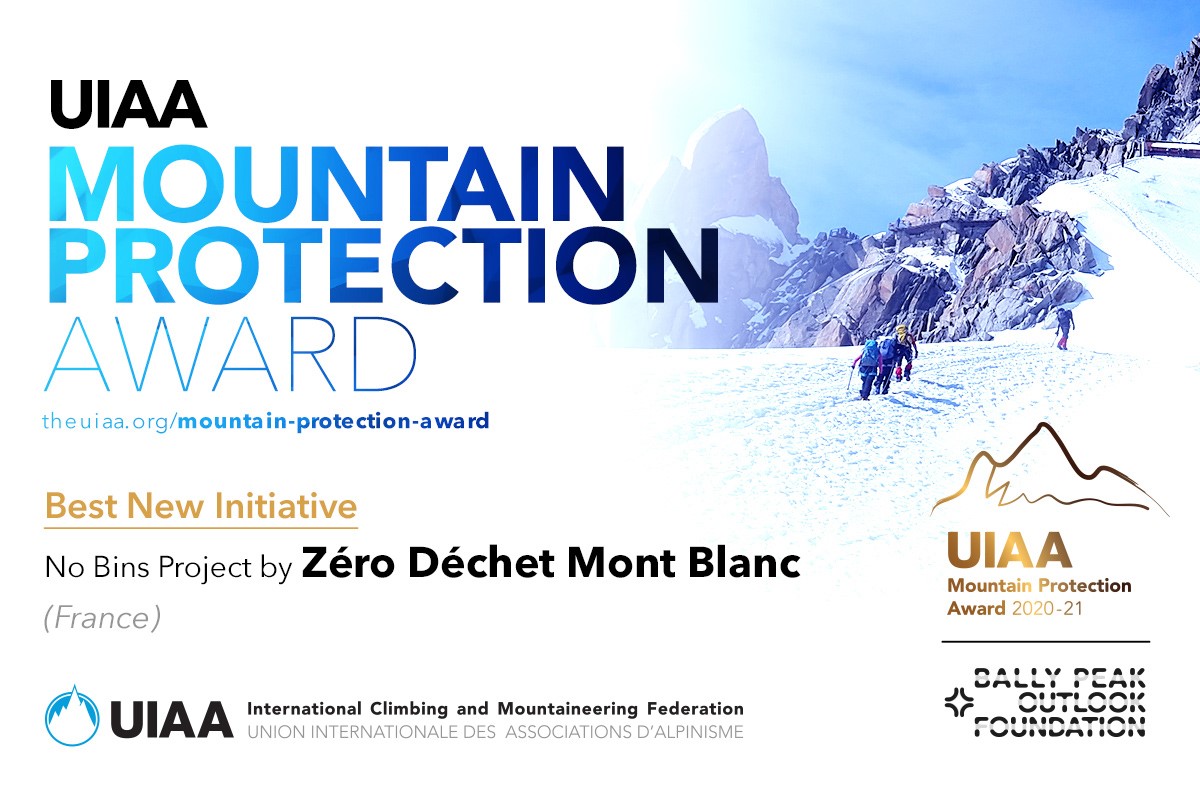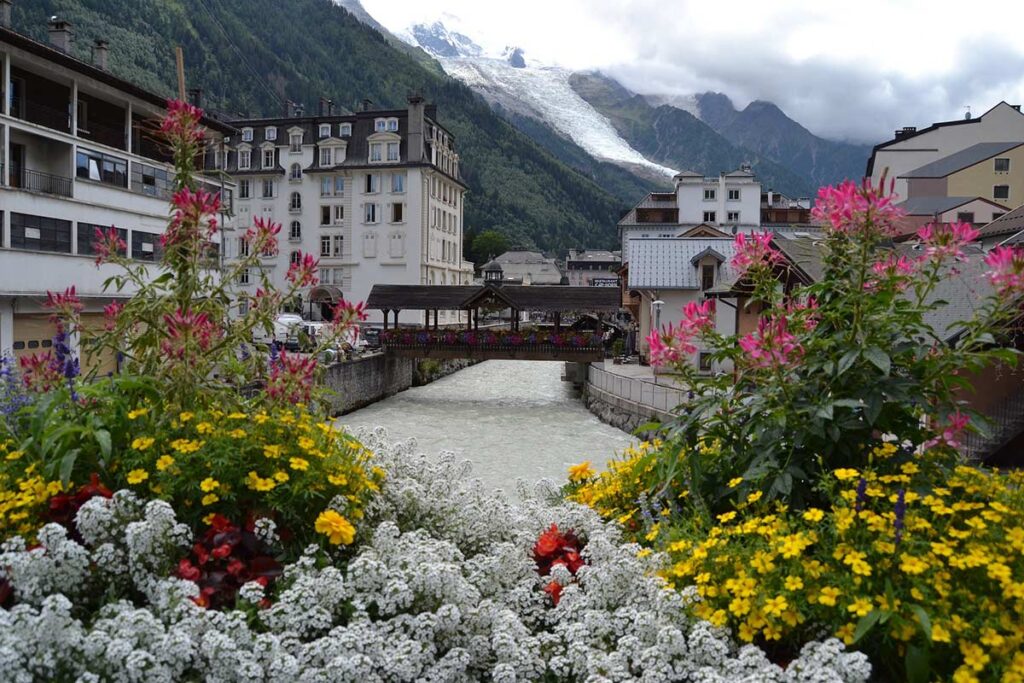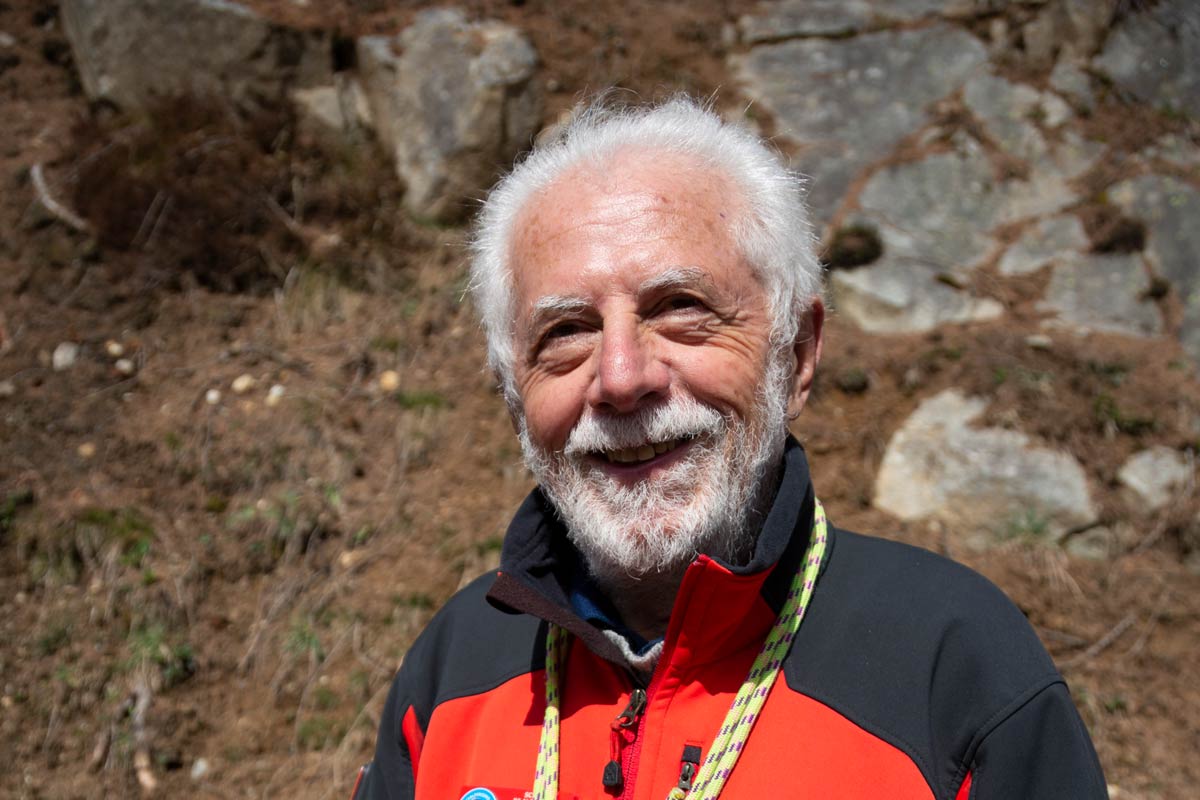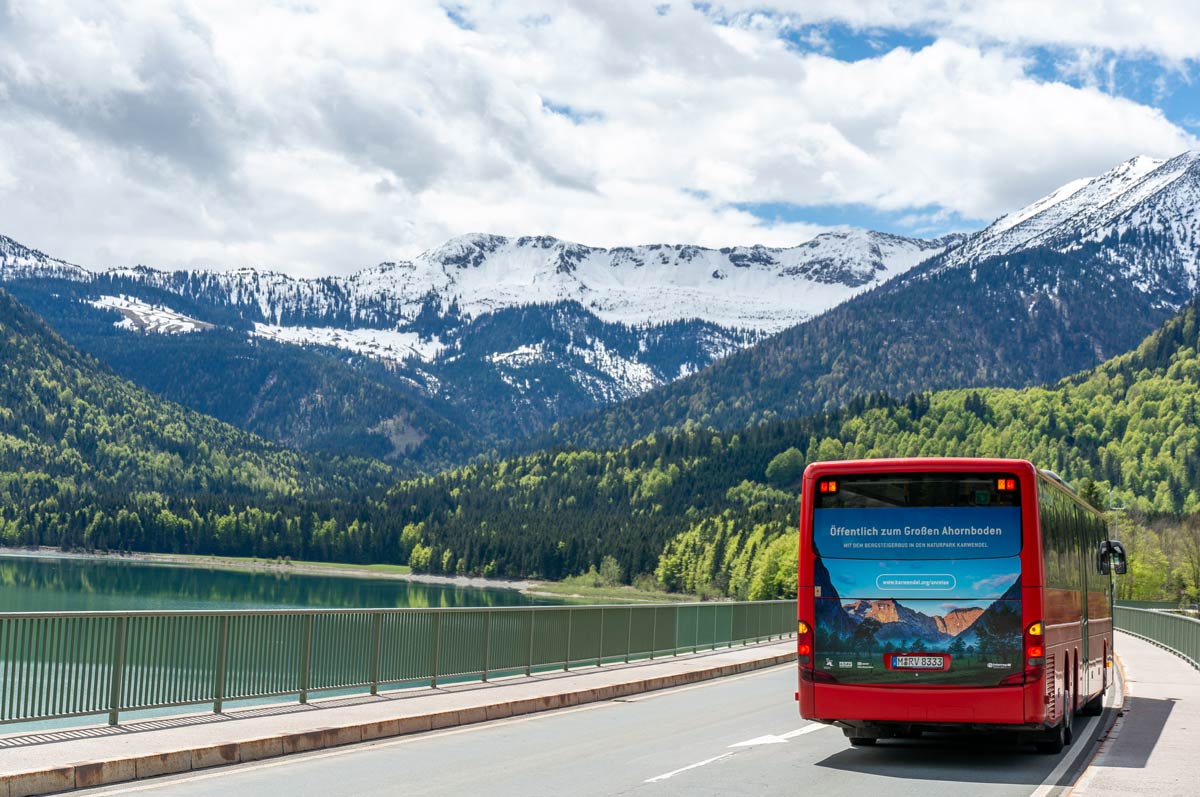The UIAA is delighted to announce that the No Bins Project by Zéro Déchet Mont Blanc (France) has been named Best New Initiative as part of the 2020-2021 UIAA Mountain Protection Award (MPA) partnered by the Bally Peak Outlook Foundation.
A total of 24 projects operational in more than 30 countries and on six continents were showcased as part of 2020-2021 MPA. They represent a range of initiatives including encouraging youth participation, tackling pollution and climate change, creating sustainable national parks, spearheading clean-up campaigns and projects focused on women in mountaineering.
The Best New Initiative is one of three prizes offered as part of the annual award. The Runner-Up will be announced on Friday 26 November and the Overall Winner during a special webinar held on Friday 3 December. Please find details on how to register and view the webinar here.
‘Initially I was surprised at the idea of “No Bins” in an area as heavily trafficked as the French Alps – but the Zéro Déchet Mont Blanc submission got me to revisit my preconceived ideas of what it means to take part in mountain tourism. “Pack it in – pack it out” is my mantra when visiting mountains like the Canadian Rockies. This project challenges us all to deepen that sensibility and bring it to more developed peaks. The phased study – implementation – assess / change – disseminate process moves this initiative beyond a “one-off” event. I think many in the mountain tourism and sustainability fields will be looking at Zéro Déchet’s work to see if it can be adapted to their high places,”
Mary Sanseverino, Award Assessor, member of the UIAA Mountain Protection Commission and research associate with the Mountain Legacy Project.
ABOUT ZÉRO DÉCHET MONT BLANC & THE NO BINS PROJECT
Zéro Déchet Mont Blanc is an association which aims to reduce waste around Mont Blanc, an area which experiences high levels of tourism in both winter and summer, including large numbers of day-trippers who come to experience easy access to the high Alps and striking views of mountains and glaciers alike.
The project’s mission, through its ‘No Bins’ initiative, is to promote and facilitate a zero waste way of life by individuals and businesses, promoting recycling/reuse and reducing the amount of waste produced in daily life. Alongside this work is a drive towards sustainable tourism. Zéro Déchet Mont Blanc wants to study waste issues associated with outdoor industries including skiing, alpinism, cycling, mountain biking, trail running and hiking, and work to reduce the waste produced by these activities.
Following the announcement of the project’s nomination as Best New Initiative, the UIAA spoke to Alison Pritchard and Raluca Ana, Zéro Déchet Mont Blanc Committee Members.
UIAA: How do you feel about winning best new initiative as part of UIAA Mountain Protection Award?
Zéro Déchet: Firstly, it is an honour! We were so excited when we heard we had been nominated, and to win the title of the Best New Initiative is a wonderful endorsement of our idea. We bring a lot of experience in various fields such as project management, marketing and communication, but being a fairly new association, this is a very rewarding moment for us, as it helps to solidify our place in the area of mountain protection. We are already very enthusiastic about our project, and this only motivates us even more!
What do you hope recognition from the UIAA Mountain Protection Award brings to the project?
Most certainly visibility and credibility among our key stakeholders in the world of tourism, environmental protection and within the local community. As we engage with future stakeholders, and during any negotiation process, this will be a big endorsement for us having the UIAA’s recognition. We are very grateful!
What are the long-term goals of your project, for example plans beyond 2022-2023?
We will promote the No Bins project and the resulting outputs as widely as we can, and we hope that a number of resorts will be interested in applying the blueprint in their area. We want to build a community of those who have undertaken the process and are keen to share learning and new ideas with their peers to develop a more sustainable tourist culture. In the following years, we hope to undertake studies to keep measuring how things are improving over time, as attitudes change and infrastructure improves. We would also like to offer our support to associations who would like to take our blueprint and apply it in their countries.
Based on your own experiences, what advice would you give to people trying to create similar projects to your own in other countries, especially those in similar high demand parts of the world?
Even if you’re not a sustainability expert, if you have a good idea don’t be frightened to take it forward. We are learning all the time – keep your ears and your minds open. It’s important to understand the impact any changes are likely to have on local businesses and infrastructure providers in the area they are targeting, and to work to engage them. We recommend talking to people, hearing feedback, and taking on board their opinions. Our approach has been to seek out personal connections where we can, a sympathetic ear is often the best route to an organisation. Last, but not least, don’t give up! Expect a few challenges but learn from them and think about what you could do differently next time.
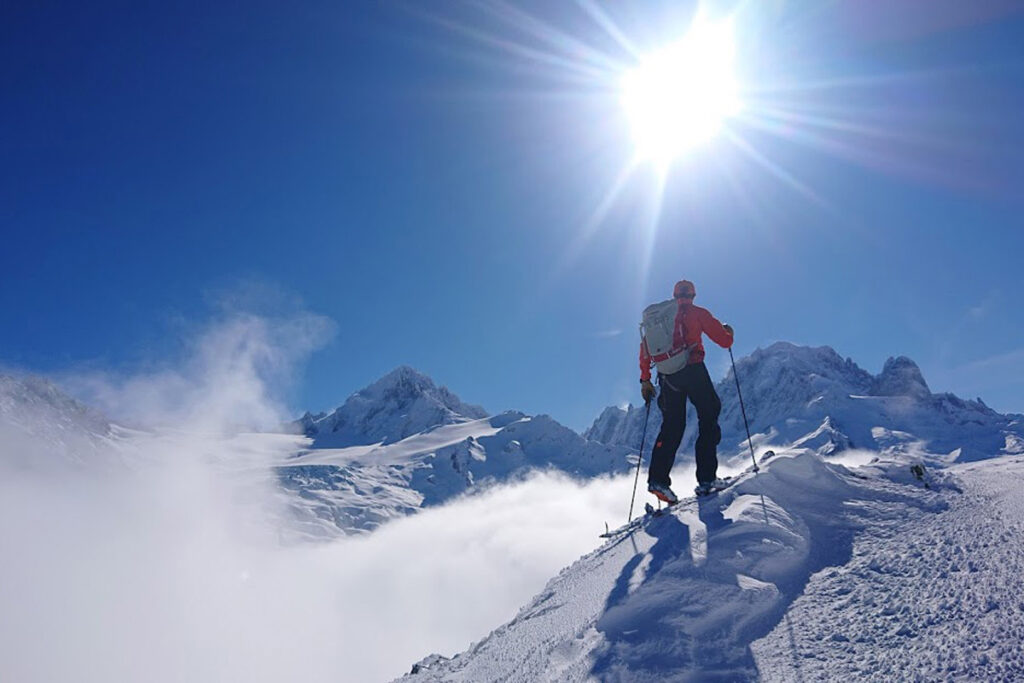
What do you think are the main challenges facing the Alps in terms of mountain protection or in terms of overtourism?
High-level commercial interests. They lead to overtourism. And our challenge should be to mediate this growth or even bring it to a stall if necessary, and shift the mindset from immediate gain to sustainable tourism, protecting the mountains, the local habitats, as well as local cultures and communities.
In your experience are climbers and mountaineers respectful mountain visitors?
Strangely enough, in countries where the mountain infrastructure is not very developed, they are more sensible, keeping old traditions (packing out all the rubbish, leave no trace, etc.), and they have lower expectations regarding hut services. They are there precisely because of the wild aspect that the mountains offer.
In the Alps however, being such a long-established mountain area in the world, and a place with high level services, ease of access, mountaineers and mountain visitors have shifted the mindset towards one with higher expectations. The more the local businesses offer, the more they ask. We quote a mountaineer from Tête Rousse, a hut at 3200m on the Normal Route to Mont Blanc, this summer: ‘it is unacceptable that in 2021 you don’t have showers on such a popular mountaineering route’.
How can climbers/mountaineers more closely engage with your project?
Get in touch with us, as we need people to spread the word among their peers, climbing buddies and clients (where applicable). We’ll need volunteers at various points and would love to work with people who cherish the mountains and would like to keep enjoying them long-term.
In what areas do you believe climbers/mountaineers need to adapt their current routines/behaviours when visiting the Alps?
Expectations from the existing infrastructure, encourage huts to reduce their carbon footprint through their choice of products, use public transport or bike more to the base of a mountain / climbing route, buy more local products and choose less packaging, buy products made from recycled materials, and recycle their old equipment. Educate their children to care for the mountains and for nature in general – any small change matters.
FURTHER INFORMATION
UIAA Mountain Protection Award
Zéro Déchet
UIAA Project Page
3 December Mountain Protection Award webinar
ABOUT THE UIAA MOUNTAIN PROTECTION AWARD
Since its conception in 2013, the UIAA Mountain Protection Award has proved an emphatic success. In the past eight years, the MPA has showcased and supported 142 projects from over 30 countries. The platform has enabled initiatives to receive international recognition, much-needed funding, exchange ideas and share best practices. Investment generated by the Award has helped projects advance in meeting key targets such as building infrastructures to improve the lives and conditions of mountain people and communities.
The Award is open to projects and associations whose activities are directly related to mountaineering and mountain-based sports and in parallel who demonstrate an engagement and collaboration with local communities to develop a culture of mountaineering activities and initiatives that are both sustainable and that attract and inspire visitors. 2020 marked an exciting new development with the Bally Peak Outlook Foundation partnering the Award for its next two editions. Nominated projects must be supported or recognised by UIAA member associations.
Please visit the official Award page for full details.
ABOUT THE BALLY PEAK OUTLOOK FOUNDATION
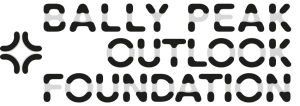
The Bally Peak Outlook Foundation was established in 2020, demonstrating the Swiss luxury brand’s long-term commitment to mountain preservation. With a mission to safeguard fragile alpine environments from the adverse effects of global warming and excessive outdoor tourism, the Bally Peak Outlook Foundation aims to raise awareness around the issues threatening the future of these extreme landscapes and empowering local communities and reputable, on-the-ground partners to drive positive and sustainable change. To learn more, visit Bally.com/peakoutlook
ABOUT BALLY
Bally is a Swiss luxury brand established in 1851, with a rich heritage in shoemaking, and a longstanding relationship to architecture, arts and the environment. Today, the brand offers unique designs across shoes, accessories and ready-to-wear, driven by a dedication to craftsmanship and a contemporary aesthetic. Bally has over 320 retail stores and 500 multi-brand points of sale spanning across 60 countries worldwide, including a global e-commerce platform serving 61 countries. For more information, please visit Bally.com

